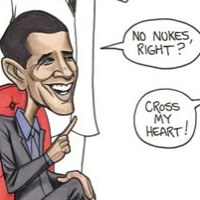![]()
RubinReports | By Barry Rubin
“After a winter of alarm over the possibility that a military conflict over the Iranian nuclear program might be imminent, American officials and outside analysts now believe that the chances of war in the near future have significantly decreased.” — New York Times, April 30, 2012

Defense Secretary Leon Panetta hosts Israeli Prime Minister Benjamin Netanyahu at the Pentagon, March 5, 2012. (Photo: Office of the Secretary of Defense)
Or, as Homer Simpson would explain it, “Doh!” I’ve been telling you this for a year but at least on this issue — unlike all the others in the Middle East — the Times has finally caught on.
As you know, just about everyone in the world outside of Israel has been claiming that an attack is imminent or that it is only being held back by the U.S. government.
My argument has been that this is simply untrue. Most of the Israeli strategic and intelligence leadership oppose an attack, for the same reasons I do. Moreover, these people don’t believe it is going to happen in the near future.
We now have Yuval Diskin, director of the Shin Bet from 2005 to 2011; Meir Dagan, former head of the Mossad; Deputy Prime Minister Dan Meridor; and assorted others who have come out against an attack.
Then there’s the commander of Israel’s military Benny Gantz who made a fascinating statement, though this has been widely misunderstood. Gantz seemed to contradict himself. He stated that Iran’s leaders were rational but also that radical Islamist ideologues might do wild things like attack Israel.
How to square the contradiction? Simple. Gantz was making a suggestion. He was telling Tehran: Wouldn’t it be smarter to stop short of building nuclear weapons when you are technically able to do so? You have the option of getting them if and when you want them but you won’t be triggering an all-out confrontation including an Israeli attack if you take this way out of your dilemma.
Note supposedly this is a point of dispute between Prime Minister Benjamin Netanyahu and President Barack Obama: Netanyahu is said to demand that Iran be prevented from having any capability at all to ever build nuclear weapons; Obama reportedly will be satisfied if Iran doesn’t actually build nuclear weapons. Well, if there is such a conflict then why is Gantz endorsing Obama‘s plan?
Gantz was not at all saying that Iran would take this alternative. He merely said that Tehran might do so. The idea, of course, is a massive version of the “good cop, bad cop” approach. At the same time, I am not suggesting that Diskin and Dagan are in on some massive con-game. They are genuinely opposed to an attack and do worry that Netanyahu might stage such an operation.
But I think the following points are the closest approximation of reality:
— Israel does not want to attack Iran. There are too many problems with such an operation. It could be done but is it necessary at present? Would there be the minimal international support needed? Would it make things better and genuinely make an Iranian nuclear attack on Israel less likely? On all those points the answer is either a clear “no” or too close to say “yes” with any degree of confidence.
— Israel prefers that the sanctions or some form of negotiations work to prevent Iran from getting nuclear weapons.
— An Israeli threat of attack simultaneously spurs the West to put more pressure on Iran to avoid a costly confrontation and more pressure on Iran itself to get it to back down in some way.
— This can only work if it is not made too clear that this strategy is a bluff, at least at this time.
— My impression is that even Defense Minister Ehud Barak has signaled that Israel is not about to attack. He has reiterated the previous position that Israel would only attack if Iran is on the verge of getting nuclear weapons, a situation that won’t exist for some time to come.
— Contrary to international perceptions, Netanyahu is not at all a reckless man and doesn’t like taking risks or launching military adventures. His record proves that point.
Personally, I agree with Diskin and Dagan that an Israeli attack would make things worse and that there is a better alternative even if Iran did get nuclear weapons. That would be a strategy combining three things:
— Deterrence to stop Iran from attacking.
— Defense to minimize the likelihood that Iran could hit Israel.
— The ability to launch a successful preemptive attack.
I have written in some detail about these three things and will do so more in future.
Finally, one point that is widely misunderstood internationally — as people draw from their own countries’ histories — is that Netanyahu is stirring up the Iran attack scenarios to mobilize domestic political support. This is simply not true. Israelis may have their own diverse views on the issue but threatening to attack Iran — as opposed to being able to defend Israel or attack Iran if necessary — is not a big vote-getter. At any rate, Netanyahu would easily be reelected in any test at the ballot box whatever he says on this issue.
And PS as an example of how ridiculous Western mass media coverage of Israel is, Jodi Redoren, the new New York Times correspondent, refers to Barak’s “hard-line position about all options — including an independent Israeli attack — remaining on the table.” That’s precisely the same policy as another Barak the New York Times would never refer to as hardline on anything, Barak Obama. The idea that keeping all options open is hardly hardline, a word that the newspaper doesn’t apply to people who advocate war and genocide against Israel.



 RSS
RSS










Latest Comments
Hello Mike, Thank you for your positive feedback to the article. I felt there wasn’t too much critical analysis of ...
Thanks for this considered and well constructed article. A follow up article on the manner in which the editorial contro...
THE CLUELESSNESS OF CLAIMING THAT OBAMA'S MIDDLE EAST POLICIES WERE A FAILURE CANNOT BE FURTHER FROM THE TRUTH, WHAT THE...
As long as Obama is the president of the usa do not trust the us government......
Thank you for an good read....